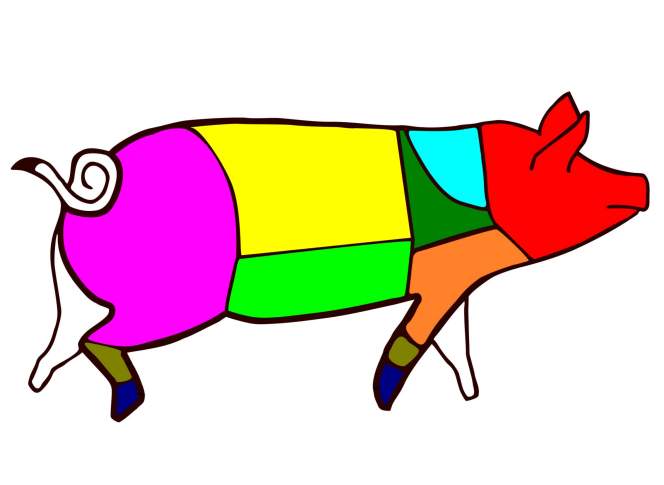How Brexit Could Affect Wisconsin's Agricultural Exports
There are likely to be very few long-term direct impacts to U.S. agriculture on account of the Brexit vote because very little of the nation's agricultural trade goes to the U.K. But there may be greater indirect effects.
September 9, 2016

Diagram of pig and pork cuts

One day after voters in the United Kingdom decided to leave the European Union, the British pound lost over 7 percent in value compared to the U.S. dollar, the Standard & Poor’s 500 index fell 3 percent, and corn, soybean, live cattle and feeder cattle futures prices fell 1 to 2 percentage points. Widely called the “Brexit” and not initially expected to pass, this decision added long-term uncertainties to international financial and commodities markets.
Event shocks such as Brexit have short-term and long-term market impacts. The short-term effects were felt in the days following the vote as the markets adjusted to the new situation and uncertainties about how the separation would proceed. The long-term impacts will be determined by how markets adjust to changes with the U.K. and E.U. over the next several years, and will include direct and indirect repercussions.
There are likely to be very few long-term direct impacts to U.S. agriculture on account of the Brexit vote because very little of the nation’s agricultural trade goes to the U.K. But there may be greater indirect effects. One indirect impact may be a stronger U.S. dollar over a longer term. The vote has caused the U.S. dollar to strengthen not only against the British pound, but against most other currencies. In turn, a strengthening dollar makes it more expensive for other countries to import U.S. agricultural products.
Wisconsin’s largest international trade partners are Canada, Mexico and China, followed by the United Kingdom, Japan and Germany. Although the U.K. is the fourth largest international trade partner for Wisconsin, only 3.7 percent of the state’s exports went to that nation in 2015, as opposed to about one-third overall going to Canada. While Wisconsin businesses sell products like machine tools and aircraft parts to the U.K., none of the state’s top exports going to that nation are agricultural products. So far, Brexit’s potential effect on Wisconsin exports looks to be mixed, the Wisconsin State Journal reported in July.
Although the U.S. exports only a small amount of meat products to the E.U. and U.K., a stronger dollar is especially concerning for producers as pork, beef and poultry prices are highly dependent on export value. For example, approximately 26.5 percent of U.S. pork and variety meat was exported in 2014. The value of these exports accounted for $62.45 per head of each hog processed that year. But currency values can affect exports. In 2014, $6.98 billion dollars of pork was exported, and in 2015 the export value was down to $5.79 billion. Although not all of this decrease was due to the strength of the dollar, was a contributing factor.
Prior to the Brexit vote, U.S. exports of meat products were decreasing, as their relative price was already higher due to the dollar’s strength. A continuing strong dollar may have a significant impact on future meat export levels. For example, since the Brexit vote, the value of the U.S. dollar has increased further over the euro. Given the E.U. has become the largest pork exporter in the world over the last couple years, a stronger dollar means even greater price competition for Wisconsin pork producers.
An additional implication of the Brexit vote concerns trade negotiations and could affect the proposed Transatlantic Trade and Investment Partnership. The U.K. is typically a moderating voice on trade and regulatory issues in the E.U. But without the U.K. as part of that body, trade negotiations, especially those concerning the disposition of GMO crops, may become more difficult as the German, French and Belgian governments currently maintain comparatively negative positions towards agricultural biotechnology. Additionally, the U.S. may now have to negotiate with the E.U. and the U.K. separately, which would involve more people and time.
Of course, there are still many questions regarding how Brexit will play out over the next couple years. Currency and commodity markets have already absorbed most of the short-term shock from the vote, but now they will need to absorb the longer-term indirect impacts. But as that implies, it will be some time before these effects emerge.
Brenda Boetel is an agricultural marketing specialist with the University of Wisconsin-Extension and a professor of agricultural economics with the University of Wisconsin-River Falls.
 Passport
Passport











Follow Us